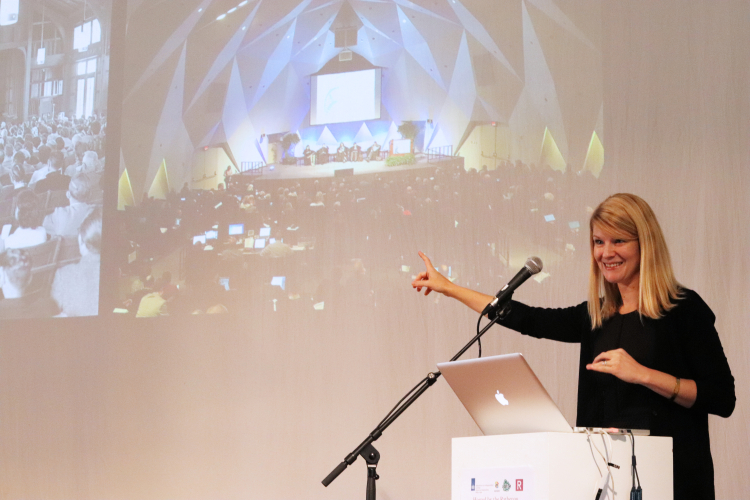iGEM students meet in The Hague: Societal value of biotechnology on the agenda
In The Hague, on 13 & 14 June, the Rathenau Instituut and RIVM, the National Institute for Public Health and Environment, hosted an iGEM meetup for students in biotechnology and their supervisors. The meetup brought about 120 people from all over Europe together, to share their experiences, knowledge and ideas related to the iGEM competition.
In short
- iGEM is a worldwide competition for students in modern biotechnology
- The Rathenau Instituut and RIVM organised a preparatory meetup in The Hague for European teams and supervisors
- The programme highlighted the importance of focusing on societal issues, safety and ethics when working on biotechnological solutions

Worldwide competition in biotechnology solutions
iGEM (International Genetically Engineered Machine Competition) gives students the chance to push the boundaries of their knowledge on modern biotechnology by tackling challenges our world is facing. Made up of primarily university students, multidisciplinary teams work together to build a system of their own design using interchangeable biological parts and standard molecular biology techniques. Every year nearly 6,000 people come together in the fall to present their work and compete in the annual Jamboree in Boston (USA).
In different parts of the world, teams come together in preparatory meetups, to improve their chances in the competition and to get the most of the "iGEM experience". RIVM and the Rathenau Instituut contribute to these best practices by educating students about ethics, and societal and safety aspects of biotechnology. When a team wants to work on a project on, for example, how we can overcome antibiotics resistance, they learn how to use current knowledge on DNA and biological processes to prevent hazardous organisms coming into our environment.
In different workshops, lectures and by playing serious games, the participants learned how to make their project sustainable. iGEM Vice president Megan Palmer was present to share her ideas with the iGEM participants.
Special guest Megan Palmer: 'Excellence means teamwork, openness and sharing'
The meetup programme kicked of with a keynote by Megan Palmer. Based at Stanford University, Megan was involved in iGEM from the beginning. She clearly showed that labwork and the progress of biological science lead to societal and governance issues that need solving before ideas can work. Even though there is exchange in ideas, and people working in labs are interested in governance and societal aspects and vice versa, there's still a lot of work to do in order to bridge governance and the lab. According to Megan, the true meaning of excellence relates to that: 'It doesn’t just mean being better than others, it also means being in competition with yourself. That is what excellence means. It also means teamwork, openness, and sharing your knowledge with others, to help them improve. To work together on global challenges and keep in mind, right from the start, who will be affected by your proposed solutions.'
Exchanging best (and worst) practices
A panel with iGEM supervisors discussed how, over the years, experiences are transferred from one team to another. Especially when it comes to being aware of the societal aspects of biotechnology, an important topic in their conversation was how the iGEM experiences have an effect on educational programmes. Luckily, this broader impact becomes more and more visible. iGEM helps to improve awareness on how modern biotechnology might help in solving societal and governance issues. It is not just about avoiding risks, but about being aware of who is affected and weighing risks and benefits. We can also learn from so-called 'failed projects'. They lead us to new and often even better ideas, the panel stressed.
Make your project matter
In order to be successful, iGEM projects address issues that require technical as well as social innovations. Students in modern biotechnology receive extensive training in dealing with technical challenges, but devote less time to understanding the societal dimensions. In the workshops, participants went through an iteration of analysis, interactions and future scenarios. Together students worked on understanding what's at stake for society, how to have meaningful conversations and capture the insights they will gain during the development of their project. During the Jamboree in Boston this fall, the jury will judge projects on all of these aspects. The Rathenau Instituut developed a tool to guide students, leading them from ideas to a business case and a societal case.
Biotech at Border Sessions festival
After an eventful afternoon with workshops, discussions, Q&A's and time to relax, the meetup programme continued as part of the Border Sessions festival. A three-day festival that brings together technology, art, society and science. The RIVM and Rathenau Instituut hosted a panel session at the festival night with experts on modern biotechnology. Cecile van der Vlugt (risk assessor GMOs at RIVM), Virgil Rerimassie (Athena Institute) and iGEM Vice president Megan Palmer discussed how the interaction between regulator, bio-designers and public can be shaped, and how to make design choices that positively impact life on earth for many future generations.
Biotechnology & society on the agenda
We look back on a very inspiring event, with lots of ideas on how modern biotechnology can contribute to societal challenges in a responsible way. Of course we wish the participating iGEM teams all the best in the Jamboree in Boston this November!